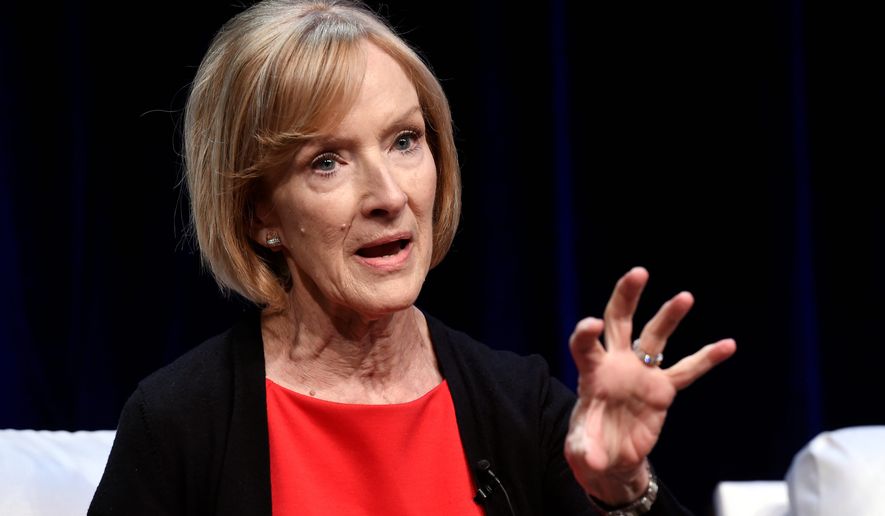By Wesley Pruden - The Washington Times - Thursday, November 8, 2018
ANALYSIS/OPINION:
The snowflake disease is catching. Donald Trump, of all people, tried to teach a couple of White House reporters a little needed manners this week and you might have thought he had repealed the First Amendment with an executive order.
Several of the snowflakes, who make their living by posing embarrassing when not rude questions to nearly everyone they talk to in pursuit of a day’s work, took to the fainting couches in the White House press lounge after the president returned shot for shell.
Yamiche Alcindor of National Public Radio asked the president why he calls himself a “nationalist” when he should know that the word has been twisted into a meaning it once never had.
“Mr. President,” she said, “on the campaign trail you called yourself a ‘nationalist,’ and some heard that as emboldening white nationalists. There are some people that say the Republican Party is seen as supporting white nationalists because of your rhetoric. What do you make of that?”
This is the classic ‘when-did-you-stop-beating your wife’ question. To answer it is to accept the premise, that a nationalist is a racist and bigot simply because “some people” say so, and that “the Republican Party is seen as supporting white nationalists because of [the president’s] rhetoric.” She apparently never learned that “some” is not a legitimate source.
The president might have delicately said something like “I have never said anything to support racial bigotry,” or merely defined “nationalism,” a devotion to national rather than international goals, and let it go. But It’s difficult for anyone, even a president, to let such an accusation go. Attributing bigotry to someone with whom you disagree has become a liberal’s first line of argument, and even a president finds it hard to ignore, and this president doesn’t do letting it go.
“I don’t know why you’d say that,” Mr. Trump replied. “Such a racist question. Honestly? Let me tell you, that’s a racist question. Why do I have the highest poll numbers ever with African Americans? That’s such a racist question. I love our country, I do. You have nationalists, and you have globalists. But to say what you said to me is so insulting to me. It’s a very terrible thing you said.”
“The Washington Press Corps,” reported one Web publication, “was floored.” The White House reporters, who can sometimes seem like a “corps,” but the reporters who cover the presidents are never so organized as a “corps.” (Aside to Barack Obama, the scholar from Harvard, Columbia, and Occidental College, it’s still pronounced as if it were spelled “core” not “corpse,” which is a dead person.)
Judy Woodruff, the National Public Radio interlocutor and dowager queen of electronic news, leaped to the defense of Yamiche Alcindor; “My [NPR] colleague Yamiche is a complete professional, an utterly fair and hardworking reporter,” she twittered on Twitter. “She did not ask a racist question.” (So there.)
John King of CNN agreed. [The president] knows the word ‘nationalist’ has baggage.” April Ryan of American Urban Radio, who describes herself as “taken aback” by the exchange between president and reporter, said Mzz Alcindor asked a real question because [the president] “is a white man who is a nationalist.” April Ryan said Mzz Alcindor was left covered by “a residue of hate,” though she still looks OK to me, a comely young woman of intelligence and of curiosity. She’s not responsible for how others see her, residue or not. Jeffrey Ballou of Al Jazeera, the Islamic network, said the president’s remarks “may be free speech, but beyond the pale of respecting the constitutionally enshrined role of journalists.”
That was a new one to me, though I have been in this business, man and boy, for a lot of years. I never knew I was “constitutionally enshrined.” The real reporter is happy to answer to “reporter,” enshrined or not and never joins the search for a four-bit word to replace the two-bit word for “newspaperman,” who knows better than to try to make himself more important than he is by becoming part of the story. Newspapermen never aspire to celebrity, even the cheesy celebrity accorded by a television camera, and are willing to abide rebuke and worse, even by a president, if that’s what it takes to get the story.
That’s the essential difference between a television journalist, for whom celebrity is the all and all, and the newspaperman, who knows he’s following a slightly impolite trade. He has no need of a snowflake’s safe space, where he can retreat from abuse and affront. He measures success by whether he gets the story, and if he gets it right that’s reward enough, and if a politician doesn’t like it, tough.
• Wesley Pruden is editor in chief emeritus of The Times.

No comments:
Post a Comment